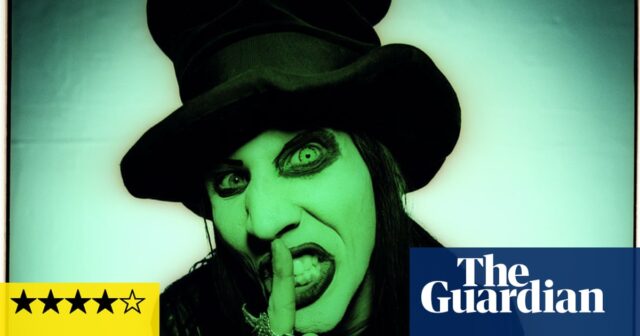Roll up, roll up – fun times are here again, especially for us ladies! Last week we had 2025’s first addition to the bulging files of true-crime stories, with the documentary series about rapist and serial killer Todd Kohlhepp (The Amazon Review Killer). Now we have the first documentary about a high-profile star claimed by multiple women to be a violent sexual predator long enabled by his fame, money and power to do exactly as he liked, to as many young women as he liked, without fear of consequence.
Marilyn Manson: Unmasked is a meticulously assembled three-part account of the shock-rock musician’s career and what was allegedly happening behind the scenes. All of which, I should say, is denied by Manson (real name Brian Warner) and on screen by his quietly terrifying lawyer Howard King, whose favourite expression seems to be “complete fabrication”.
It follows what has become, depressingly, the traditional trajectory of interviewing the accused’s friends and associates, interwoven with testimony from his alleged victims, and allowing the viewer’s viewpoint to evolve. Former bandmate Stephen Bier is emblematic of the struggle we see play out in so many of what we might call witnesses for the defence in such programmes: keen not to seem unsympathetic, but finding it hard not to let an underlying incredulity show through. Being on a rock tour, he admits, “is a test of your virtue … And minors have different brains, they haven’t developed, et cetera, et cetera. But that’s a legal problem!” Bier has an unfortunate tendency to punctuate his thoughts with laughter. He also notes that the tour manager would write the age of consent up in the bus “because they’re different in every state”. He seems to think this is proof of something good. But, gosh – I might venture that it is indicative of something quite other.
Manson’s most famous accuser is his former girlfriend and now film and television star Evan Rachel Wood. She testified at a 2018 congressional hearing regarding a domestic-violence prevention bill to years of horrific abuse at a partner’s hands, and later named him as Manson. It encouraged other women to come forward with similar stories, and lawsuits against the musician began to accumulate. Some he has settled, others are ongoing. According to his fans, Wood is orchestrating a campaign of lies against him and persuading other women to join in. Wood asks if that is more likely than the notion that “a bad person has been doing bad things for a really long time”.
Beyond setting out the timelines and testimonies that must form the spine of this kind of documentary, Marilyn Manson: Unmasked teases out the question of how able people should have been to distinguish between performative transgressions designed to shock (and build the notoriety upon which his career depended) and a man hiding terrible proclivities in plain sight. There is plentiful footage of Manson on stage saying to his screaming fans things like “Which one of you sixth graders wants me to make you feel like a goddamn eighth grader?” and “Send some of those little eighth-grader girls up here so I can put my whole arm inside them”, and referring to their “sticky pussies”. I think most of us would have been on high alert by then. But perhaps it would depend on how much money he was making for us. And how much we thought we could blame anyone for getting involved with a self-proclaimed Satan lover. “If you’re a vegetarian, don’t go to a hamburger shop,” advises one of his former colleagues.
What are we to make of the crew who apparently didn’t realise a barely conscious Wood was, she says now, being raped by Manson as they filmed the Heart-Shaped Glasses – a Lolita reference – music video? Their silence and professed ignorance is proof, according to King, of another of those “complete fabrications” by a woman determined “to destroy Brian professionally and emotionally”. Again, it is possible to feel quite otherwise.
What do we make of the media who at his peak uncritically adored Manson’s controversial ways and endless quotability? Not that all of his comments made it into print. The last episode contains previously unheard excerpts of the audiotapes that were a prelude to a Rolling Stone magazine piece. For example, “I’m not into rape whatsoever … I prefer to break a woman down to the point where they have no choice but to submit to me. Rape is for cowards, for lazy people.” It chimes perfectly with the onscreen testimonies of his alleged victims, including and especially Wood. But it was probably just his persona speaking. Just a performance. Because who could believe there are men out there who are really like that?



